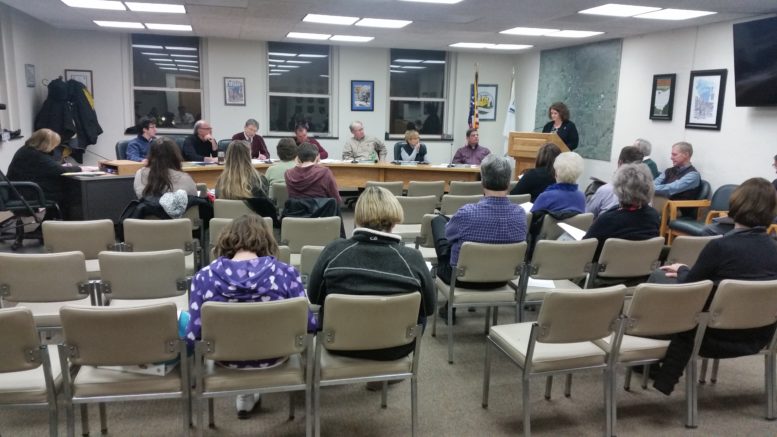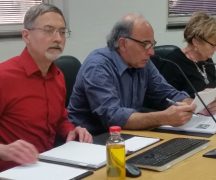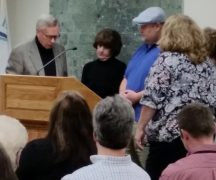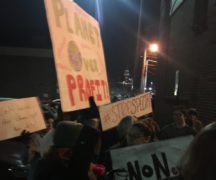By JAN LARSON McLAUGHLIN
BG Independent News
Bowling Green needs to stop the “brain drain,” and give BGSU students an opportunity to stay here after graduation. That means offering the type of jobs and housing that millennials want.
At the other end of the age spectrum, Bowling Green needs to address the fact that Oak Grove Cemetery will soon be full.
Bowling Green City Council members discussed those and other priorities during a Saturday morning goal setting session.
All the members identified the city’s Community Action Plan as a primary issue for 2018.
With the plan nearly completed, Bill Herald said now is the city’s chance to “put some substance to it.” That may mean housing inspections, or working more closely with the county health district to make city neighborhoods more attractive, he said.
Sandy Rowland said she is looking forward to seeing the CAP report. “Certainly we have invested a lot of money in this,” she said.
Though the CAP is expected to make several recommendations to the city about neighborhood revitalization, Bruce Jeffers cautioned that the money must be available for the city to implement the plans. “We have to be very careful about that,” he said.
John Zanfardino said his top goal is neighborhood revitalization. “That’s the goal that drives me most,” he said. But he suggested that the city not forget the older structures in the city, and study how other college towns have handled the issue.
“We can’t lose sight of what exists,” Zanfardino said.
Daniel Gordon said his constituents want quality, affordable housing on the East Side. The CAP will likely offer solutions, but council may need to enact tough policies such as housing inspections.
“We have to be bold enough to seek those solutions,” Gordon said. “We need to do the right thing by our residents.”
Greg Robinette said it will be necessary for council to establish attainable priorities since the city likely cannot afford all the recommendations. “That’s the hard part,” he said.
“I think we’re very much aligned,” Council President Mike Aspacher said about the Community Action Plan.
Multiple council members also addressed the issue of the city not being attractive to young potential residents.
“I’m very concerned that we’re not returning students in our community,” Rowland said, calling it “brain drain.” Those young people are seeking good jobs plus a comfortable, safe, sweet and historic town, she said. Many want a different type of housing than Bowling Green offers, with safe bicycling and pedestrian options.
“We have to attract millennials,” Rowland said.
Jeffers agreed the city needs to find a way to attract those younger residents.
“If we want people to come – especially young professionals – we need the right kind of neighborhoods, the right kind of housing,” Jeffers said.
And that might mean that some type of housing inspection program should be implemented, he said.
“I think a big focus is going to be on new construction in old neighborhoods,” Jeffers said. “I’m very focused on the CAP and very focused on revitalizing neighborhoods.”
Zanfardino agreed that some type of housing licensing or inspection program may be needed. “We need to safeguard what already exists in town,” he said.
The city’s plan to examine the ordinance on food trucks will also be helpful, Zanfardino said. “That’s the kind of thing that excites millennials.”
Aspacher said the city has gotten requests from entrepreneurs and residents for food trucks. “We’ve heard this fairly consistently,” he said.
Aspacher suggested the housing exterior maintenance code may need to be updated. The zoning office and county health district follow up on complaints, but often there are no citable offenses – despite the fact that the homes don’t meet customary standards.
Diversifying economic development and providing jobs with livable wages will also help, Gordon said.
“A lot of folks who graduate from BGSU would like to stay here, but they feel they can’t,” he said.
Robinette said economic development should always be at the forefront of council’s decision making. The city must establish conditions that make businesses want to be in Bowling Green, he said.
“It all can and should lead toward that,” Robinette said. “We’re creating the environment that makes businesses want to move here.” That may mean a review of the city’s zoning code, he added.
When the city administration makes its annual visits to local businesses, in addition to talking with company officials, they may also want to talk with employees to ask why they do or don’t wish to live in Bowling Green, Robinette suggested.
Council members also listed other priorities for 2018.
Herald said drainage is an issue he heard a lot about as he campaigned door-to-door last fall. “I do know we live in a swamp,” he said. But the flooding issue in something that must be solved. “People pay their income tax” and deserve to have the drainage problem remedied.
Rowland said the city needs to tackle the fact that Oak Grove Cemetery will soon be out of space, and that the city administration building is already out of space.
“I think we need to get serious about that,” she said about the cemetery. And though the city does not have the funding for a new city building, Rowland reminded that the current structure is overcrowded and “not up to code.”
Rowland said she was relieved to learn that the police division would be helping respond to code enforcement problems.
Jeffers praised efforts to diversify the city’s economy, since the community needs income tax growth to continue its balanced budget.
Aspacher agreed. “That really has to be one of our priorities. That is the engine” that makes the city run, he said.
Jeffers said the city’s decision to create the position of sustainability coordinator is “fantastic.” He stressed the importance of the city’s clean energy efforts. “I want us to continue pushing forward.”
Zanfardino suggested the city return to its Complete Streets efforts that would expand safe bicycling routes. “We’ve kind of gotten away from it,” he said.
Gordon agreed and said the city should work on bike lanes and installing sidewalks where they don’t exist. “We need to resume our efforts to implement Complete Streets in Bowling Green,” he said.
Gordon also mentioned the need for shelters for local people without homes. Robinette reported that a BGSU class is currently tackling that need.
Robinette said the city should work to create stronger relationships with Bowling Green City Schools and Bowling Green State University.
“Both are very, very important to the economic success of our city,” he said.
Robinette also said the city should work on improving communication with residents, since a lot of misunderstanding seems to exist. “I think we need to review how we communicate with citizens,” he said.
Aspacher said the city need to continue supporting utility operations. And Jeffers and Zanfardino said efforts need to continue to make immigrants welcome in Bowling Green.





